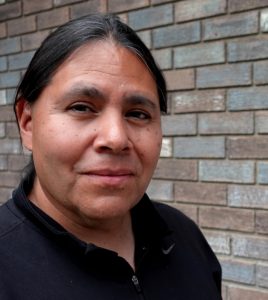Podcast: Play in new window | Download (Duration: 55:44 — 38.3MB) | Embed
Each side presented their oral arguments Wednesday to the U.S. Supreme Court for the most serious challenge to the Indian Child Welfare Act in recent memory. The decision in Haaland v. Brackeen will be a major force in the future of ICWA and the scope of tribal sovereignty. Today on Native America Calling, Shawn Spruce analyzes the legal debate from a Native perspective with Matthew Fletcher (Grand Traverse Band of Ottawa and Chippewa Indians), law professor at the University of Michigan Law School and author of the Turtle Talk blog; independent journalist Suzette Brewer (citizen of the Cherokee Nation); and Dr. Sarah Kastelic (Alutiiq), director of the National Indian Child Welfare Association.
Break 1 music: Migwitch Mahnomen (song) Chippewa Pow-Wow Drum Group In Ball Club, Leech Lake Reservation (artist) Songs of the Chippewa, Vol. 1 – Minnesota Chippewa Game and Social Dance Songs (album)
Break 2 music: Keep Rising (song) House of Shem (artist) Keep Rising (album)


Back in 1972 they were dispersing Indian children through the United States Icwa was not set up in a way to help the native Americans it gave 10 days and in those days 10 days was not enough time to prepare a case now it is which makes it better for us I used the icwa to regain my grandson it’s a story that you will all want to hear I fought icwa at the same time using that Congressional law in my advantage we must not lose this Congressional act it works for us now where it didn’t then it’s very important that we do not lose it or our children will suffer it gives the states rights to grab our children and that is wrong do not let the genocide of our children happen again it’s imperative we hold on to equal it is ours now not the governments my case was a precedence
We have to remember back in the 70s states are grabbing native American children by the thousands dispersing them through the United States this was their way to destroy our tribes our Chiefs marched on Washington and sat with Congress and ask them to stop this horrible community discussions and actions that the states were taking in the United States Congress passed the Indian child welfare act since then States like Arizona Texas Utah have been tearing down the bylaws on this act I defeated Arizona one of the worst they wanted to get on the reservations and start taking our children into the foster care system they never knew or thought with the process of time taxes cell phones that the speed of the 10-day notice now made the child welfare act ours to protect our children this is a very serious situation at one point the states are using the children to balance out their Federal budgets or their state budgets and using them as money and they want more that’s why they want our children
I don’t deny the atrocities of the past. But the current practice (in my experience as a foster parent) is less about the current children and their mental and emotional well being, and more of “Well look what happened in the ’70’s”. While we don’t want history to be repeated, we need to meet in the middle. Reunification with parents is 100% the goal. When that breaks down it should be what is in the best interest of the child. ICWA is used as a monolith action in these cases when not all tribes are alike, have the same resources or interests. Why not use this act to legally enforce tribal connections with whomever adopts the child? As an example, one of my first foster cases was a sibling set of 3, mom was Native American (ICWA was involved) and each of the 3 fathers were not Native American. The tribe was unable to absorb the children and any type of permanency that kept the siblings together was blocked by the tribe. They end up being separated, living with non tribal family members that have zero incentive to remain close to the tribe or keep the sibling connection in tact. While I would have; to keep them together, adopted them and done whatever the tribe asked of me to make sure they remained closed to their tribe. How has the tribe won in this case? These children may be with non tribal family members, but they are lost to the tribe. Where if the tribe had been part of the path to adoption, the kids could have remained close to the tribe.